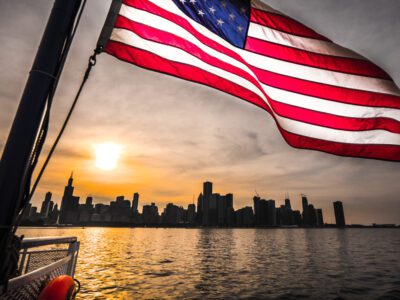Welcome back to Letter From America. As always, we’re bringing you the week’s top headlines from the “Land of Opportunity”, starting with Pennsylvania’s record-breaking financial year.
Pennsylvania Smashes Records
The Pennsylvania Gaming Control Board (PGCB) has released its full-year revenue report for FY 2024–25 (ending June 30), and it’s nothing short of historic.
The state’s gambling industry raked in an all-time high of US$6.39 billion (£4.92bn) in revenue, smashing last year’s record of US$5.89 billion (£4.53bn). That’s a jump of 8.52 percent and a new benchmark for one of the U.S.’s most successful 360 iGaming states.
Tax contributions, used to finance state programmes and services, reached US$2.79 billion (£2.15bn).
Retail slots stayed steady, up 0.08 percent year-on-year, generating US$2.44 billion (£1.88bn), while retail tables dropped by 3.04 percent to US$928 million (£714m).
iGaming continued its seemingly unstoppable trajectory, growing by 27.9 percent to US$2.47 billion (£1.9bn), with sports betting revenue dipping 0.22 percent, y-o-y, to US$487.6 million (£375m).
Since online gaming launched in the state it has generated over US$8.3 billion (£6.4bn) in revenue, and the total market has nearly doubled in size.
Jersey Surge
June’s monthly data from the New Jersey Department of Gaming Enforcement showed strong growth, especially in sports betting, as the NBA Finals and golf’s U.S. Open dominated.
Total gaming revenue in the Garden State grew 18.4 percent, y-o-y, for the month, reaching US$581.6 million (£447.6m), but down 5.4 percent on May’s total of US$614.7 million (£472.3m).
iGaming climbed 23.5 percent, year over year, hitting US$230.7 million (£177.6m), with FanDuel leading DraftKings.
Sports betting revenue increased dramatically, up 52.9 percent, y-o-y, to US$91.2 million (£70.2m).
Land-based casinos, nevertheless, remained the biggest earners, with revenue of US$259 million (£199.4m), up 6.1 percent y-o-y.
Prodigal Polymarket Returns
As the fight for the future of U.S. gambling intensifies–DraftKings just acquired Railbird Exchange, for example–Polymarket announced on June 21 its acquisition of Commodity Futures Trading Commission (CFTC) licensed exchange QCEX for US$112 million (£83.1m).
Polymarket, founded in the U.S. in 2020, was one of the world’s largest prediction markets but it ceased trading in 2022 after the CFTC charged it with operating an unregistered derivatives trading platform, resulting in a $1.4 million (£1.03m) fine.
Explaining the reboot, Shayne Coplan, Founder and CEO of Polymarket, said: “Demand is greater than ever. Not just in user growth and trading volume, but in how mainstream audiences are turning to Polymarket to separate signal from noise, bias, and speculation.
“Now, with the acquisition of QCEX, we are laying the foundation to bring Polymarket home.”
BetMGM’s Big Bet
In the wake of Illinois’ new per-bet tax system, operators have been busy devising inventive workarounds.
While FanDuel, DraftKings and Fanatics have adopted per-bet surcharges, BetMGM is taking a different path and has implemented a minimum bet threshold.
BetMGM is asking bettors to wager at least US$2.50 (£1.93) or above. Hard Rock has also followed this strategy, but with a slightly lower threshold of US$2 (£1.54).
It will be fascinating to see which option bettors prefer over the coming months.
Whose Line Is It Anyway?
In the fragmented regulatory framework of U.S. gambling, there’s no consistent nationwide standard for problem gambling services or provision, but there is the 1-800-GAMBLER helpline.
Run by the National Council on Problem Gambling (NCPG), the helpline connects those struggling with compulsive gambling to local resources, but its future is now under threat.
The helpline–owned by the Council on Compulsive Gambling of New Jersey (CCGNJ)–has been licensed to the NCPG since 2022, but the current contract is up, and talks have stalled.
The NCPG wants an extension; the CCGNJ won’t engage, prompting the former to seek a temporary restraining order to keep the line active while an arrangement is reached.
The restraining order is in effect until August 26, but what comes next for America’s most well-known problem gambling helpline– and its users–remains uncertain.
iCasino Blowout
This year’s surprise contender, Maine, almost passed an online casino bill but failed at the last hurdle, as Governor Janet Mills (D) refused to sign LD1164.
And Mills said she will not approve it until the legislature reconvenes in December, meaning the iCasino bill is effectively iced for 2025.
This marks the second consecutive year in the United States where there has been no new iCasino legislation.
The last state to adopt full iGaming was Rhode Island in 2023.




